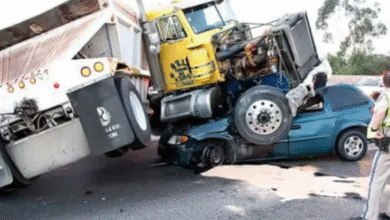Can a Phoenix Auto Accident Attorney Help After a Serious Motorcycle Wreck?

Yes, a Phoenix auto accident attorney can help after a serious motorcycle wreck. Motorcycle collisions often result in catastrophic injuries, and Arizona law allows injured riders to seek compensation when another driver’s negligence is to blame. An attorney assists by investigating the crash, identifying liable parties, and negotiating with insurance companies that may attempt to deny or minimise valid claims.
Motorcycle wrecks frequently involve complex disputes over fault, road conditions, or driver visibility. Insurance carriers may argue that riders assumed the risk or contributed to the crash, even when evidence suggests otherwise. A Phoenix auto accident attorney can counter these strategies, gather witness testimony, and ensure the injured rider’s rights are protected under Arizona’s comparative negligence laws.
When Can You File a Claim After a Motorcycle Wreck in Phoenix?
You can file a claim after a serious motorcycle wreck in Phoenix if another driver violated traffic laws, drove distracted, or failed to yield. Arizona requires all drivers to exercise reasonable care, and breaching this duty can establish liability. Even when the fault is contested, an attorney can use accident reconstruction, medical records, and police reports to build a strong case for compensation.
Claims are also possible against multiple parties. For example, if a defective motorcycle part contributed to the crash, the manufacturer may share liability for the incident. Similarly, if poor road maintenance caused the wreck, a government entity could be held accountable.
What Types of Compensation Are Available After a Motorcycle Accident?
In a Phoenix motorcycle accident case, compensation may include both economic and non-economic damages. Economic damages cover medical expenses, lost wages, rehabilitation costs, and property damage. Non-economic damages address pain, suffering, and diminished quality of life caused by lasting injuries.
In catastrophic cases involving spinal cord damage, traumatic brain injuries, or permanent disability, future medical needs and long-term care costs are also considered. Courts may also award punitive damages if the at-fault party’s conduct was reckless or showed extreme disregard for safety.
How Does Comparative Negligence Affect Motorcycle Accident Claims?
Arizona applies a pure comparative negligence rule in motorcycle accident claims. This means a rider can still recover damages even if partially responsible for the crash. However, their compensation is reduced by the percentage of fault attributed to them. For instance, if a rider is 30% at fault, their award is reduced accordingly. This legal framework allows for recovery but often complicates negotiations with insurance companies, which seek to limit payouts whenever multiple parties share responsibility.
Consider an example where a motorcyclist is speeding slightly, but another driver runs a red light and causes the collision. If the rider is found 20% at fault, they can still recover 80% of the damages. This percentage-based system acknowledges shared responsibility while ensuring that victims are not entirely barred from compensation. It emphasises the importance of demonstrating how much fault belongs to the negligent driver rather than the rider.
Insurance companies frequently exploit comparative negligence to undervalue claims. Adjusters may overstate a rider’s fault, citing factors such as lane positioning, speed, or lack of protective gear, to reduce payouts. Without strong legal advocacy, riders risk accepting less than they are entitled to. A skilled attorney challenges these tactics by presenting evidence such as accident reconstructions, witness testimony, and traffic camera footage to secure fair compensation that genuinely reflects the rider’s injuries and financial losses.
What Evidence Strengthens a Motorcycle Wreck Claim?
Evidence plays a critical role in proving liability after a Phoenix motorcycle wreck. Strong documentation may include police crash reports, medical records, photos of the accident scene, damaged motorcycle parts, skid mark analysis, witness statements, and surveillance footage that supports negligence and injury claims effectively.
- Police accident reports confirming traffic violations.
- Eyewitness statements supporting the rider’s account
- Surveillance or dashcam footage capturing the collision
- Medical records linking injuries directly to the crash
- Accident reconstruction analysis from expert witnesses
Maintaining this evidence helps counter insurer arguments and establishes the full scope of losses suffered by the injured rider. It strengthens negotiations, supports medical and financial claims, and ensures victims pursue rightful compensation for treatment, lost wages, property damage, and long-term recovery needs.
Are Punitive Damages Possible in Motorcycle Wreck Cases?
Yes, punitive damages may be awarded in Phoenix motorcycle wreck cases, but only in specific circumstances. These damages are designed to punish reckless or egregious conduct rather than simply compensate the victim. Drunk driving, excessive speeding, or illegal street racing may justify punitive damages when such actions clearly endanger public safety.
However, punitive damages demand clear and convincing evidence of intentional misconduct or extreme negligence. They are not automatically available in every motorcycle accident case. Victims often need aggressive litigation, expert testimony, and skilled advocacy to pursue these damages successfully and hold the at-fault driver fully accountable for reckless actions.
How Do Insurance Companies Handle Motorcycle Accident Claims?
Insurance companies often handle motorcycle accident claims with greater scepticism than car accident cases. Adjusters may argue that motorcyclists assume higher risks by choosing to ride, making them partially responsible for their own injuries. They also tend to inflate a rider’s fault percentage, which reduces the overall payout. By focusing on these narratives, insurers aim to minimise liability and protect profits, leaving injured riders at risk of inadequate compensation.
Common tactics used by insurers include delaying claim responses, requesting unnecessary paperwork, or offering quick settlements far below the actual value of the case. They may also challenge the severity of medical injuries, claiming they are preexisting or exaggerated. These strategies create stress and financial strain for victims who need immediate support. Without skilled legal help, many riders often feel pressured to accept settlements that fail to compensate for their actual losses fully.
A Phoenix auto accident attorney can counter these tactics by building a strong case supported by evidence. This includes collecting medical records, police reports, witness testimony, and expert analysis to prove liability and damages. Attorneys also request complete claim files from insurers to expose undervaluation practices. By presenting detailed documentation and negotiating aggressively, they ensure victims secure fair compensation that accounts for treatment, lost income, and long-term recovery needs.
Do You Have to Go Through Arbitration Before Filing a Motorcycle Claim?
In Arizona, riders do not always have to go through arbitration before filing a motorcycle accident lawsuit. However, many insurance policies include binding arbitration clauses, especially for uninsured or underinsured motorist (UM/UIM) claims. These provisions require disputes to be resolved through arbitration first, which can significantly impact how quickly victims access compensation and the level of control they have over the process compared to traditional litigation in court.
Arbitration is designed to provide a faster, less expensive alternative to trial, but it often favours insurers because they are more familiar with the process. Riders may face strict rules regarding the presentation of evidence, limited discovery options, and restrictions on appeals. This means policyholders must carefully prepare their cases to ensure fair outcomes. Understanding whether arbitration is mandatory is crucial because skipping the process could jeopardise a victim’s right to pursue damages.
Bad-faith claims against insurers typically bypass arbitration altogether. These claims arise when insurance companies delay, deny, or undervalue payouts without valid reasons. Since bad-faith actions are considered separate legal disputes, they are often filed directly in court. Reviewing the exact policy language with a qualified attorney helps determine whether arbitration applies, when it can be avoided, and how best to protect the rider’s rights in the claims process.
What Role Does Subrogation Play in Motorcycle Accident Claims?
Subrogation allows insurers to recover amounts they paid by pursuing reimbursement from the at-fault driver’s insurance. While this process does not remove the rider’s right to compensation, it can affect settlement negotiations and timelines.
For example, if a health insurer covers hospital bills after the crash, they may seek repayment from the motorcycle accident settlement. An attorney can negotiate lien reductions and ensure subrogation does not unfairly reduce the rider’s net recovery.
FAQs
Can I Sue the At-Fault Driver and My Insurer at the Same Time?
Yes. You may pursue claims against the negligent driver while also filing with your own insurer if coverage is delayed, denied, or undervalued. This dual approach ensures accountability and provides multiple avenues to recover compensation for your injuries and financial losses.
What Types of Injuries Are Common in Serious Motorcycle Wrecks?
Motorcycle wrecks often result in catastrophic injuries, including traumatic brain injuries, spinal cord damage, multiple fractures, and severe road rash. These conditions frequently require long-term treatment, rehabilitation and may cause permanent disabilities, creating significant medical expenses and impacting victims’ quality of life.
How Long Do I Have to File a Motorcycle Accident Lawsuit in Arizona?
In Arizona, you generally have two years from the date of the crash to file a motorcycle accident lawsuit. Missing this statute of limitations deadline usually prevents recovery, so taking prompt legal action is critical to preserve your right to compensation.
Does Not Wearing a Helmet Affect My Claim?
Arizona law requires helmets only for riders under the age of 18. Adults may still file claims without wearing one, but insurers may argue it contributed to injury severity. This can reduce compensation, making strong legal representation essential to counter comparative negligence claims.
Why Trust Gallagher Law Group After a Motorcycle Wreck?
After a serious motorcycle accident, victims often face overwhelming challenges. Medical bills can skyrocket, time away from work reduces income, and insurers frequently dispute or undervalue claims. Without skilled legal help, riders risk missed deadlines, denied coverage, or settlements far below what they truly deserve.
Our attorneys thoroughly investigate, gather critical evidence, and challenge insurance companies that attempt to avoid responsibility. From filing uninsured motorist claims to pursuing litigation when necessary, we focus on securing maximum compensation so you can concentrate on recovery and rebuilding your life.



